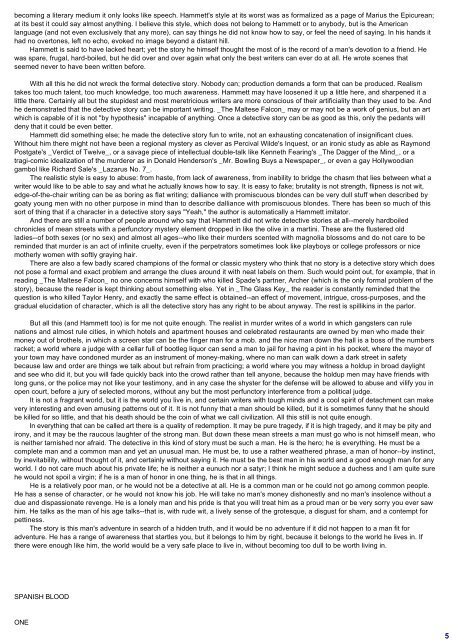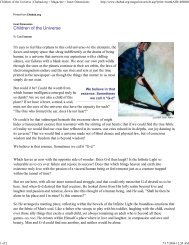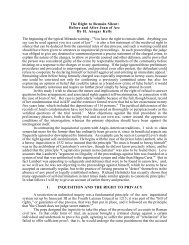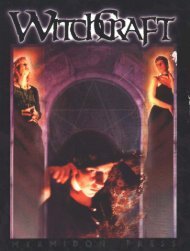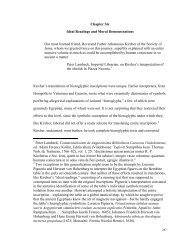THE SIMPLE ART OF MURDER by Raymond Chandler Copyright ...
THE SIMPLE ART OF MURDER by Raymond Chandler Copyright ...
THE SIMPLE ART OF MURDER by Raymond Chandler Copyright ...
You also want an ePaper? Increase the reach of your titles
YUMPU automatically turns print PDFs into web optimized ePapers that Google loves.
ecoming a literary medium it only looks like speech. Hammett's style at its worst was as formalized as a page of Marius the Epicurean;<br />
at its best it could say almost anything. I believe this style, which does not belong to Hammett or to anybody, but is the American<br />
language (and not even exclusively that any more), can say things he did not know how to say, or feel the need of saying. In his hands it<br />
had no overtones, left no echo, evoked no image beyond a distant hill.<br />
Hammett is said to have lacked heart; yet the story he himself thought the most of is the record of a man's devotion to a friend. He<br />
was spare, frugal, hard-boiled, but he did over and over again what only the best writers can ever do at all. He wrote scenes that<br />
seemed never to have been written before.<br />
With all this he did not wreck the formal detective story. Nobody can; production demands a form that can be produced. Realism<br />
takes too much talent, too much knowledge, too much awareness. Hammett may have loosened it up a little here, and sharpened it a<br />
little there. Certainly all but the stupidest and most meretricious writers are more conscious of their artificiality than they used to be. And<br />
he demonstrated that the detective story can be important writing. _The Maltese Falcon_ may or may not be a work of genius, but an art<br />
which is capable of it is not "<strong>by</strong> hypothesis" incapable of anything. Once a detective story can be as good as this, only the pedants will<br />
deny that it could be even better.<br />
Hammett did something else; he made the detective story fun to write, not an exhausting concatenation of insignificant clues.<br />
Without him there might not have been a regional mystery as clever as Percival Wilde's Inquest, or an ironic study as able as <strong>Raymond</strong><br />
Postgate's _Verdict of Twelve_, or a savage piece of intellectual double-talk like Kenneth Fearing's _The Dagger of the Mind_, or a<br />
tragi-comic idealization of the murderer as in Donald Henderson's _Mr. Bowling Buys a Newspaper_, or even a gay Hollywoodian<br />
gambol like Richard Sale's _Lazarus No. 7_.<br />
The realistic style is easy to abuse: from haste, from lack of awareness, from inability to bridge the chasm that lies between what a<br />
writer would like to be able to say and what he actually knows how to say. It is easy to fake; brutality is not strength, flipness is not wit,<br />
edge-of-the-chair writing can be as boring as flat writing; dalliance with promiscuous blondes can be very dull stuff when described <strong>by</strong><br />
goaty young men with no other purpose in mind than to describe dalliance with promiscuous blondes. There has been so much of this<br />
sort of thing that if a character in a detective story says "Yeah," the author is automatically a Hammett imitator.<br />
And there are still a number of people around who say that Hammett did not write detective stories at all--merely hardboiled<br />
chronicles of mean streets with a perfunctory mystery element dropped in like the olive in a martini. These are the flustered old<br />
ladies--of both sexes (or no sex) and almost all ages--who like their murders scented with magnolia blossoms and do not care to be<br />
reminded that murder is an act of infinite cruelty, even if the perpetrators sometimes look like playboys or college professors or nice<br />
motherly women with softly graying hair.<br />
There are also a few badly scared champions of the formal or classic mystery who think that no story is a detective story which does<br />
not pose a formal and exact problem and arrange the clues around it with neat labels on them. Such would point out, for example, that in<br />
reading _The Maltese Falcon_ no one concerns himself with who killed Spade's partner, Archer (which is the only formal problem of the<br />
story), because the reader is kept thinking about something else. Yet in _The Glass Key_ the reader is constantly reminded that the<br />
question is who killed Taylor Henry, and exactly the same effect is obtained--an effect of movement, intrigue, cross-purposes, and the<br />
gradual elucidation of character, which is all the detective story has any right to be about anyway. The rest is spillikins in the parlor.<br />
But all this (and Hammett too) is for me not quite enough. The realist in murder writes of a world in which gangsters can rule<br />
nations and almost rule cities, in which hotels and apartment houses and celebrated restaurants are owned <strong>by</strong> men who made their<br />
money out of brothels, in which a screen star can be the finger man for a mob. and the nice man down the hall is a boss of the numbers<br />
racket; a world where a judge with a cellar full of bootleg liquor can send a man to jail for having a pint in his pocket, where the mayor of<br />
your town may have condoned murder as an instrument of money-making, where no man can walk down a dark street in safety<br />
because law and order are things we talk about but refrain from practicing; a world where you may witness a holdup in broad daylight<br />
and see who did it, but you will fade quickly back into the crowd rather than tell anyone, because the holdup men may have friends with<br />
long guns, or the police may not like your testimony, and in any case the shyster for the defense will be allowed to abuse and vilify you in<br />
open court, before a jury of selected morons, without any but the most perfunctory interference from a political judge.<br />
It is not a fragrant world, but it is the world you live in, and certain writers with tough minds and a cool spirit of detachment can make<br />
very interesting and even amusing patterns out of it. It is not funny that a man should be killed, but it is sometimes funny that he should<br />
be killed for so little, and that his death should be the coin of what we call civilization. All this still is not quite enough.<br />
In everything that can be called art there is a quality of redemption. It may be pure tragedy, if it is high tragedy, and it may be pity and<br />
irony, and it may be the raucous laughter of the strong man. But down these mean streets a man must go who is not himself mean, who<br />
is neither tarnished nor afraid. The detective in this kind of story must be such a man. He is the hero; he is everything. He must be a<br />
complete man and a common man and yet an unusual man. He must be, to use a rather weathered phrase, a man of honor--<strong>by</strong> instinct,<br />
<strong>by</strong> inevitability, without thought of it, and certainly without saying it. He must be the best man in his world and a good enough man for any<br />
world. I do not care much about his private life; he is neither a eunuch nor a satyr; I think he might seduce a duchess and I am quite sure<br />
he would not spoil a virgin; if he is a man of honor in one thing, he is that in all things.<br />
He is a relatively poor man, or he would not be a detective at all. He is a common man or he could not go among common people.<br />
He has a sense of character, or he would not know his job. He will take no man's money dishonestly and no man's insolence without a<br />
due and dispassionate revenge. He is a lonely man and his pride is that you will treat him as a proud man or be very sorry you ever saw<br />
him. He talks as the man of his age talks--that is, with rude wit, a lively sense of the grotesque, a disgust for sham, and a contempt for<br />
pettiness.<br />
The story is this man's adventure in search of a hidden truth, and it would be no adventure if it did not happen to a man fit for<br />
adventure. He has a range of awareness that startles you, but it belongs to him <strong>by</strong> right, because it belongs to the world he lives in. If<br />
there were enough like him, the world would be a very safe place to live in, without becoming too dull to be worth living in.<br />
SPANISH BLOOD<br />
ONE<br />
5


